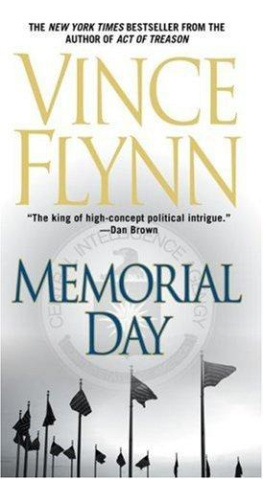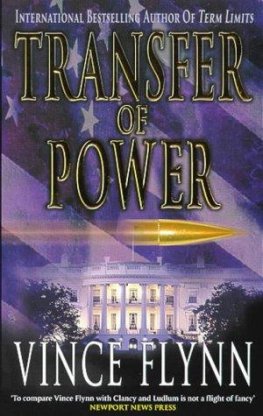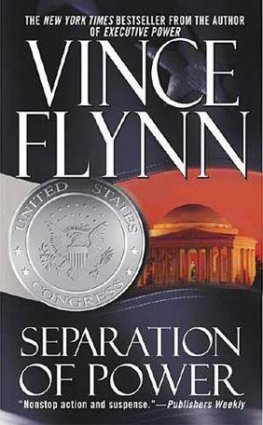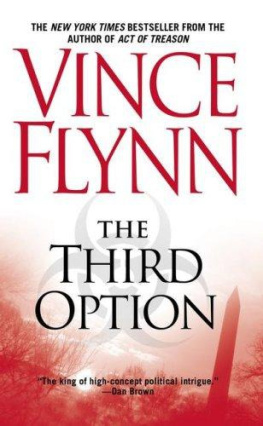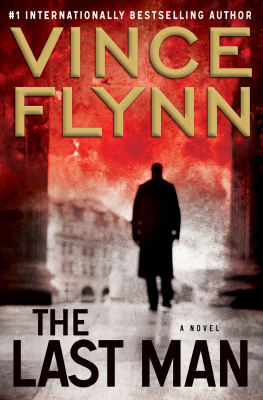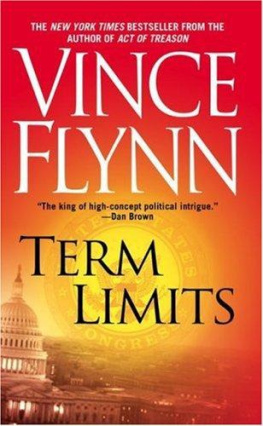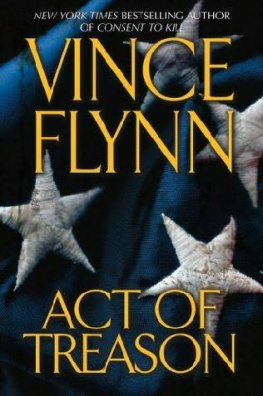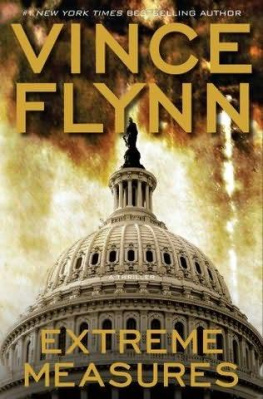
Vince Flynn
Act of Treason
The seventh book in the Mitch Rapp series
With the exception of researching and touring, the life of a writer tends to be very solitary-never more so than when under deadline. Every year my wife, Lysa, puts up with the long hours and the fact that even when Im home, Im often mentally elsewhere-usually trying to figure out how Mitch Rapp is going to wring someones neck. I am a lucky man to be married to such an awesome woman.
To my editor, Emily Bestler, and my agent Sloan Harris, thank you yet again for your patience and sage advice. To Alan Rautbort of ICM for pushing me to write my first script. To David Brown, who in addition to being a great guy, is one fantastic publicist. To Jamie Kimmes, my new assistant-youve been a huge help this year. Thank you for all of your hard work. To everyone at the Simon amp; Schuster family, especially Jack Romanos, Carolyn Reidy, Judith Curr, Louise Burke, Sarah Branham, Jodi Lipper, and Alyson Mazzarelli. And a special thanks to production for yet again putting up with my frantic writing schedule.
To Dr. Jodi Bakkegard, the best chiropractor in the Twin Cities, thank you for keeping me fit all the way to the finish line. To Dave Woodfill and the entire crew at the Apple Store in Edina, thank you for solving all things technical. To Dan Marso for his humor and patience while designing my new website, and to Chad Harris for his input and the great job he did on that website, thethirdoption. net. To Tom Aslesen for his friendship and helping me out with a few technical aspects of the book. To Al Horner, retired Navy SEAL, and firearms instructor extraordinaire.
To Blake Gottesman, thank you for your commitment to the big guy. Im sure you are missed. To Rob Richer, a good friend and an even bigger smartass. To Mary Matalin for your honesty, class, and wit. To Paul Evancoe and FNH-the new 5.7 is awesome. To Colonel Kevin M. McDonnell, Command Sergeant Major Parry L. Baer and the Combined Joint Special Operations Task Force-Arabian Peninsula, you have given me a great honor that I will never forget. And to all the men and women who serve, your commitment and sacrifice is something that I think of every day.
WASHINGTON, DCOCTOBER
The motorcade rumbled down the cobblestone street. Three motorcycles led the way, followed by a DC police squad, two Secret Service sedans, and then two identical limousines. After the limousines came the Suburbans and more sedans. It was an impressive sight, especially when one considered that the two men being protected had yet to win the White House. However, earlier in the week a fringe terrorist group had announced their intent to disrupt the upcoming election, and the Secret Service had no choice but to take the threat seriously.
Mark Ross sat in the back seat of the second limousine and massaged his forehead. A monster headache was building from the base of his brain and slowly spreading to the front. He tried to block out the incessant chatter of the man sitting next to him, while at the same time wondering just how in the hell he had gotten himself into this mess. He would have been better off staying in the Senate where he had real power. It was power, though, that had gotten him here. Or at least the promise of it.
The relationship was cracking. There was no doubt about it. It had always been an arranged marriage of sorts. They each had their strengths and weaknesses, and for the most part they didnt overlap. It was explained to them by the power brokers and gatekeepers that they would complement each other perfectly. On paper it all looked perfect. A real marriage made in heaven. If they had bothered to read any of the classic Greek tragedies, though, they would have known that the gods could be very cruel. Especially when it came to the hubris of men.
Ross had naturally been aware of Josh Alexander all along. Alexander, the up-and-coming star of the Democratic Party, was governor of Georgia. The old white men who ran the party had finally got it through their heads that a Northeast liberal was simply unelectable. Their only real chance of winning was to draft a Southern governor who believed in Jesus Christ. This way they could split the Bible Belt vote and steal enough red states to win it all. Alexander was the obvious choice. He was handsome, smart, and polished, and his wifes family had more money than most third-world countries. His only drawback was his relative youth. At forty-five he was deemed a touch green, and definitely weak on foreign affairs. His early polling numbers suggested that people werent sure he would be a strong enough leader in the war on terror. That was where Mark Ross came in. A three-term senator from Connecticut, Ross was the new director of National Intelligence. He had a reputation as one of the more hawkish Democrats in Washington.
In a normal national election, the two men would have never ended up as running mates. This election, however, had been turned on its ear when the current president announced that he had Parkinsons disease and would not be seeking a second term. With only a year to go before the general election, the party was caught flat-footed. The primary season was upon them and the only real candidate they had was Vice President Sherman Baxter III. Everybody, including the president, agreed that Baxter would be a disaster. He was perhaps the most marginalized vice president in the history of the republic, and that was saying a lot. The mans approval rating in his home state of California was below thirty percent. A lot of things could have been ignored, but not that number. The party elders pulled him aside and told him it was the end of the road. Having been confronted with his limits and deficiencies for the last three years, the man did not put up a fight.
Ross, in the meantime, worked feverishly behind the scenes. He was well connected on Wall Street; regarded highly by his old club, the U.S. Senate; and savvy enough to know not to throw his hat in the ring too early. He waited until New Hampshire, when Alexander walked away as the clear front-runner. Then he began networking, pushing the idea that the young governor needed a running mate who had some gravitas in the national security arena. He sent his surrogates to lobby on his behalf. He personally wined and dined the partys big money people and he carefully began to court the handsome, young governor from Georgia.
Everything fell into place exactly as Ross had wished. When he took the stage at the national convention, the place erupted. They hit the ground with a bounce and an eight-point lead. That had been three months ago. The pinnacle. The apogee of the campaign. Since then theyd been bleeding like a stuck pig. With two weeks until Election Day they trailed their opponents by three points, and Ross was feeling the pressure. Their pollsters kept coming back with the same problem. Voters perceived the pair as weaker than their opponents on national security. This was where Ross was supposed to step in and fill the breach, but how could he have known the president would leave them high and dry?
The man had abandoned them in their hour of need. Yes, he had endorsed them, but what in the hell else was he going to do? Endorse the Republican ticket? Campaigning on their behalf was assumed. It was all part of the battle plan. He would help them raise the millions of dollars it would take to win the TV ad race. He would step in and use that bully pulpit to announce his confidence in the young candidate and his seasoned running mate. But all they got was silence and a cold shoulder.
The press was told that the presidents disease was taking a toll on him, and he simply didnt have the energy to campaign. His obligation was to his office and the American people. Ross believed the excuse for a few days, and then reality set in. Word had gotten back to him through two solid sources that the president had a real problem with the ticket. He was offended that no one had bothered to consult him as to who Alexander should pick as a running mate. Beyond that, the president made it clear that he considered Ross the wrong choice.
Next page

